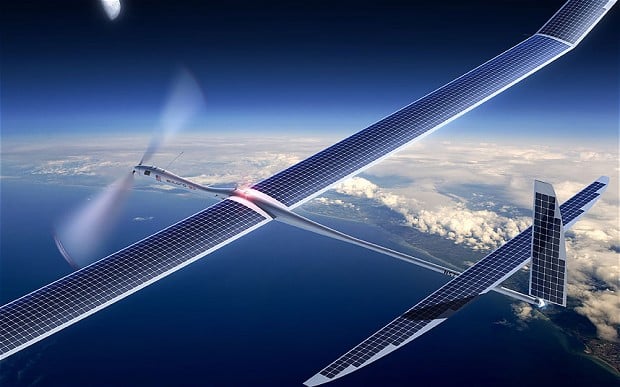Robots and drones have definitely marked the technological advancement of the coming era. Recently the world has witnessed the release of many new robots, humanoids and drones. After the spectacular release of Google’s project loon , we have a new drone set to bamboozle the world with its wonders. The Facebook founder Mark Zuckerberg has announced the release of this drone under the project of Internet.org. This facebook drone is all set to introduce it with its last and final test and release being covered up in the year 2015. Mark has tried to move out of his social networking campaign and has declared his new found desire to connect the entire human population to the World Wide Web (though it is only a speculation as remote tribes will certainly not be a part of it) and these drones will facilitate the same.
This project is not limited to just drones flying around you but is multitude to satellites adorned with infrared lasers too. These satellites in combination with the drone will enable the authorities to provide a service reachable to all even in remote areas. It is a prototype of making the World Wide Web an actual virtual web surrounding the earth. We can easily formulate Mark’s interest in this matter as this project will not only reveal the world to vast amount of information the infinite virtual space but it will also expose Facebook to a much greater level than it is now. It is a clever scheme but nevertheless very effective.
The project of this expanse is definitely met with cost and profits parameters. But Facebook backed organizations have solid plans that according to them will surly work. Instead of going with petty balloon tricks like the Project Loon has they are working on transmitting information based on more complex methodologies that have higher success rates like the infrared laser transmitting technology. Certainly questions were raised regarding why Zuckerberg preferred drones, to which he gave satisfactory answers. According to Mark, these drones will provide efficient access to the location under these machines, something that cannot be expected from a balloon driven piece of intelligence. Mark has always worked to keep his ideas and designs above all to be considered the best and so is he taking this project to be. The illuminating technical minds behind the world’s longest flying solar-powered unmanned craft called Zephyr, will be joining the Facebook Connectivity Lab on this enticing venture.
See also: Facebook’s Drone to Battle Google’s balloons in sky
This step is certainly a big leap for Facebook as this project will allow the 5 billion souls of earth to access the internet facilities something which project Loon of Google certainly can’t accomplish. Observing this noble step many other well known companies have also come forward to play a role in this project like Samsung, Qualcomm, Nokia, MediaTek, Opera and Ericsson. Internet data access is in the hands of telecommunication operators at last so Zuckerberg is resolving this by placing them on the high seat and simultaneously developing low budget yet efficient smartphones. Then there is the factor of data consumption also. Less data consumption means low cost. So the company is also looking for ways to reduce the data required for running any service, contemplating to include data compressing tools and other similar ideas.

